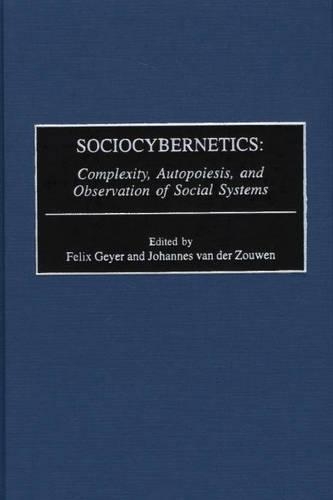
Sociocybernetics: Complexity, Autopoiesis, and Observation of Social Systems
(Hardback)
Publishing Details
Sociocybernetics: Complexity, Autopoiesis, and Observation of Social Systems
By (Author) Rudolf F. Geyer
Edited by Johannes van der Zouwen
Bloomsbury Publishing PLC
Praeger Publishers Inc
30th January 2001
United States
Classifications
Tertiary Education
Non Fiction
301
Physical Properties
Hardback
264
Width 156mm, Height 235mm
482g
Description
In an effort to shed light on recent developments in sociocybernetic research, this volume represents recent and advanced thinking in this rapidly developing field. The authors address the core problems in social science caused by increasing societal complexity and analyze the inadequacy of many of the methodological tools still used for grappling with nonlinear, self-organizing systems. Together, the 18 contributors propose elements of a new methodology based on sociocybernetic principles aimed at describing and explaining the growth of societal complexity, the contribution of autopoiesis of societal subunits to more societal complexity, and the new simulation-based methodology needed to observe complex social systems. This unique volume contributes to a greater understanding of sociocybernetics and its uses as a method for researching modern problems of increasing complexity and interdependence. The first part of the book deals with increasing societal complexity and contains chapters on its overall development, the complexity of brain-environment interaction loops, organizational change, the development of human values, and the increasing interpenetration of societal subsystems. The second part concentrates on a current issue in sociocybernetics: autopoiesis, or self-production. The chapters included in Part II concentrate on embodied cognition, on the applicability of autopoiesis to business firms, on its roots in Aristotelian philosophy, and on the possibility of societal control and steering in democratic societies. Part III, more focused on methodology, discusses the difficulties inherent in observing complex social systems. The chapters deal with the problems of cross-cultural comparative research, simulation of the evolution of social systems, longitudinal simulation of education systems, and the methodological difficulties associated with analyzing the unexpected complexities of mutually interacting nonlinear systems.
Author Bio
FELIX GEYER headed the methodology section of SISWO,(Institute for the Social Sciences), and has been retired since 1998. He is an honorary fellow of the World Organization of General Systems and Cybernetics and serves on the editorial board of the journal Kybernetes. Geyer was also executive secretary and member of the Executive Committee of the International Sociological Association, He has published extensively in the fields of alienation theory and General Systems Theory/sociocybernetics. JOHANNES VAN DER ZOUWEN is a professor in the Social Research Methodology department at Free University, The Netherlands. He is an honorary fellow of the World Organization of General Systems and Cybernetics and a member of the editorial board of its official journal Kybernetes. He has edited or coedited five books and published numerous articles and book chapters.
